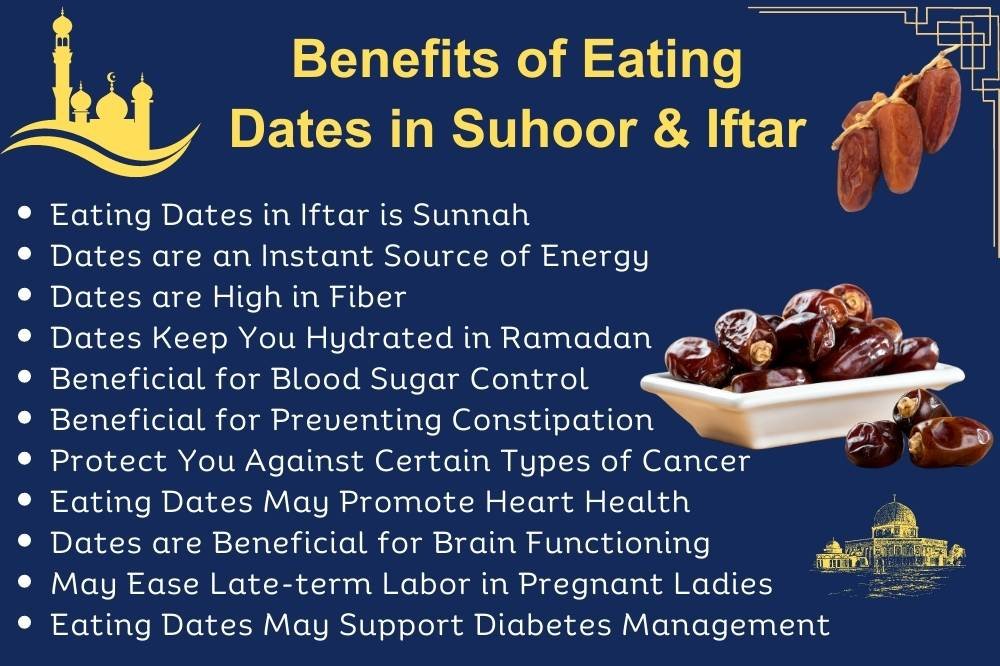Benefits of Dates for Iftar and Suhoor in Ramadan

Benefits of Dates for Iftar and Suhoor in Ramadan
Dates are the fruit grown in many tropical regions of the world and have become quite popular in recent years. Dates are sold as dried generally. You can choose fresh or dried based on your choice. There are many varieties of dates depending on the size, color, and taste of dates. Commonly consumed varieties include Medjool and Deglet Noor dates.
What are the Benefits of dates in Iftar and suhoor?
Dates are a traditional food that is often eaten during iftar (the meal that breaks the fast) and suhoor, the pre-dawn meal during Ramadan. People choose food for their meals very consciously during Ramadan and dates are the choice of every person. There are multiple reasons why people love dates.
Here are some of the benefits of eating dates during Ramadan:
Eating Dates in Iftar is Sunnah
There is nothing high for Muslims than a Sunnah. Lovers of Prophet Muhammad (peace be upon him) try to follow what Prophet Muhammad (peace be upon him) did in their life. Eating dates in an iftar meal is a religious tradition because Prophet Muhammad (peace be upon him) used to eat dates in iftar and Suhoor during Ramadan and even in other months. Therefore, eating dates in iftar and suhoor is considered a Sunnah in Islam.
Nutritious Facts of Dates

Dates contain vitamins and minerals, such as potassium, magnesium, and iron, which are important for maintaining good health. One date (8g) provides 23 calories, 0.6g of fiber, 0.2g of protein, 6.0g of carbohydrates, and 0.1mg of iron. Moreover, dates have no fat.
An Instant Source of Energy

When a man fasts for a whole day, he feels exhausted at the end of the day. Dates are a natural source of sugar, which can provide an immediate boost of energy to break the fast during iftar. Moreover, dates are very beneficial when you eat in suhoor to start the day full of energy.
Dates are High in Fiber
Dates are high in fiber, which can help to regulate digestion and prevent constipation, a common issue during Ramadan. Dates contain 7-8% of fiber which is quite sufficient for fiber intake.
Dates Keep You Hydrated in Ramadan
Many people suffer dehydration during fasting because they drink less water during non-fasting hours. Eating dates during Ramadan can be a good source of water, which can help to keep you hydrated during fasting hours.
Dates are a Satisfying Food for Suhoor and Iftar
Dates serve multipurpose. You can eat dates as a meal or you can taste them to enjoy the good taste. You can take it to kill your hunger instantly. You can make a shake of dates that is heavy enough that will keep your stomach full the whole day. You can use dates in the fruit-chart in your iftar meal. Dates are a sweet and satisfying food that can help to curb hunger pangs during fasting hours.
Other Health Benefits of Dates:
Dates are high in several nutrients, fiber, and antioxidants, all of which may provide health benefits ranging from improved digestion to a reduced risk of disease. Below are some of the main benefits of dates:
- The fiber in dates can benefit your digestive health.
- Dates are beneficial for preventing constipation.
- Dates promote regular bowel movements by contributing to the formation of stool.
- The fiber in dates may be beneficial for blood sugar control.
- Antioxidants in dates, like Flavonoids, may help reduce inflammation and reduce the risk of diabetes. (1)
- Dates also protect you against certain types of cancer.
- Eating dates may promote heart health.
- Dates may also reduce the risk of eye-related disorders, such as macular degeneration.
- Dates are beneficial for brain functioning.
- Eating dates during the last few weeks of pregnancy may ease late-term labor in pregnant ladies.(2)
- Dates contain several minerals, including phosphorus, calcium, and magnesium which prevent bone-related conditions like osteoporosis.
- Eating dates may support diabetes management.
Avoid Excessive Consumption of Dates
Dates are definitely worth adding to your dining table during suhoor and iftar meals. , as they are both nutritious and delicious. The high nutrition and sweet taste of dates make them easy to overeat. Dried dates are higher in calories than fresh fruit so it is important to avoid excessive consumption of dates. Overeating can cause digestive abdominal disorders or gastrointestinal issues. Overeating can raise your potassium levels, skin rashes, and fructose intolerance. Dates also can cause weight gain.
Bottom Line
Overall, dates are a nutritious and beneficial food to incorporate into your diet during Ramadan. You can add dates to your dining table at any time and in any season. Dates provide you with instant energy. Eating raw dates as a whole can help you to lose weight. Dates can cause weight gain when you make milkshakes or soak them in milk for a night.They provide energy, hydration, and other health benefits, making them ideal food to eat during fasting hours.


You May Also Like

Best Dishes for Suhoor Meal in Ramadan | Pre-dawn Meal
18/02/2023
Increase Your Height Naturally With These Simple Steps
09/03/2022